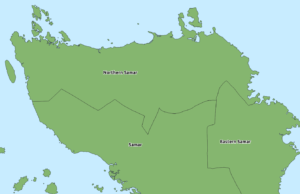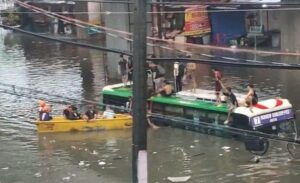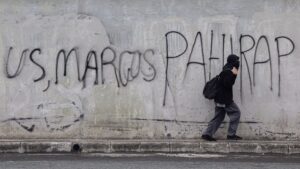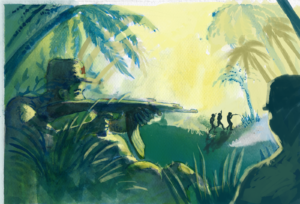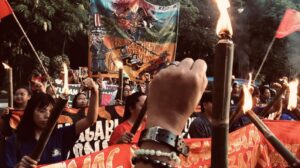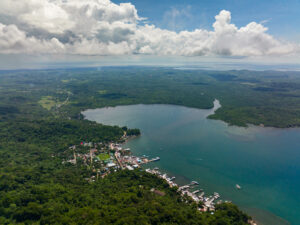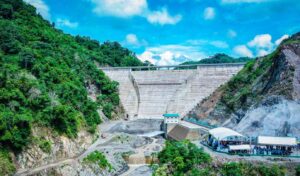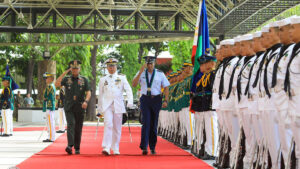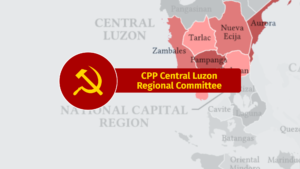Celebrate the 50th year of the CPP! Resolutely fight and overthrow the fascist tyranny of the US-Duterte regime! Win ever greater revolutionary victories for the Filipino working class and people!
ON THE MOMENTOUS OCCASION OF THE 50TH FOUNDING ANNIVERSARY OF THE COMMUNIST PARTY OF THE Philippines (CPP), we, the Executive Committee of the Negros Regional Party Committee, take pride in raising high our fists in Red salute of all Party cadres and members on the island, all Red commanders and fighters of the New People’s Army’s (NPA) Apolinario Gatmaitan Command (AGC), all allied forces of the National Democratic Front of the Philippines (NDFP) in Negros, and all progressive and patriotic Negrense people.
We are singularly honored as well to convey, on behalf of the revolutionary forces and people of Negros Occidental and Negros Oriental, our warmest greetings of revolutionary solidarity to the entire national membership of the Party and the CPP Central Committee.
We share in the elation of workers, peasants and other exploited and oppressed masses all over Negros and the country as the CPP, founded on December 26, 1968 on the theoretical guidance of Marxism-Leninism-Maoism (MLM), arrives today at its historic five-decade milestone as vanguard of the Filipino proletariat and leader of the Philippine revolution.
We pay the highest revolutionary honors to the hundreds of proletarian revolutionaries, guerilla forces and mass activists of Negros who have lived and died in the last fifty years for the noble cause of national democracy and a socialist future.
Recent events, moreover, prompt us to dedicate the observance of the Party’s 50th year on the island particularly in memoriam of and in seeking justice for the nine farm worker victims of the Sagay massacre, the single most heinous incident of peasant killings thus far under the fascist US-Duterte regime.
Like the victims of the Escalante massacre during the Marcos dictatorship, they are among the people’s martyrs and heroes of Negros whose supreme sacrifices for the aspirations of the toiling masses weigh as heavy as Mt. Kanlaon.
And as Kanlaon is not only the highest peak on the island but also an active volcano that has come to symbolize social unrest in Negros, the memory of their exemplary lives and those of Apolinario Gatmaitan, Leonardo Panaligan, Roselyn Pelle, Armando Sumayang, Jr. and Rachelle Mae Palang, among other martyrs of the people’s war, should keep our revolutionary spirit constantly aflame and explosive.
�
The great five-decade achievements of the Party and the Philippine revolution
That a handful of young proletarian revolutionaries were able to re-establish the CPP in 1968 and daringly lead the resumption of the unfinished national democratic revolution of the Katipunan is in itself a feat of great historic significance by any standards.
The fact that such has been celebrated uninterruptedly each single year for the last half-century makes it all the more deeply inscribed in history and could only attest to the exceptional revolutionary resolve and resilience of the Filipino proletariat and people.
Through 50 long years of arduous struggle against imperialism, feudalism and bureaucrat capitalism, the Party, people’s army and the revolutionary united front have cumulatively gained strength, grown in wisdom, and earned the confidence and support of the people in their vast numbers.
The emergence of the Party, its all-round development and its ability to achieve one victory after another have all been made possible by the correct application and integration of the theoretical guidance of MLM to the concrete conditions of Philippine society and the concrete practice of the Philippine revolution.
The Party has defined the two stages of the Philippine revolution and has been carrying out the general political line of people’s democratic revolution through protracted people’s war using the weapons of armed struggle and the revolutionary united front.
By upholding the principle of democratic centralism, it has been assuring itself of building and keeping the most solid organizational unity.
The Party is deeply rooted in the life and struggle of the Filipino workers, peasants and other exploited and oppressed classes and sectors in all the 18 regions of the country.
The Party absolutely leads the regional operational commands of the NPA that are now in 17 regions covering 110 guerrilla fronts and are composed of the strongest and most organized armed revolutionary forces ever assembled in Philippine history.
In the face of brutal counterrevolutionary campaigns launched in succession by seven reactionary regimes under US supervision, the Party, people’s army and the people have been heroic in remaining committed to the armed revolution which is now considered to be among the strongest and longest-running in the world.
It is at the core of the basic revolutionary mass organizations as well as the local organs of political power which constitute the people’s democratic government of workers and peasants with millions of people under its governance and influence.
It is at the forefront of varied forms of struggles of the different patriotic and progressive organizations and alliances – clandestine and open, in the countryside and in the cities, and even abroad – that have already achieved significant gains over the decades including the historic ouster of two puppet regimes in 1986 and in 2001.
The Party prevails over its weaknesses, rectifies errors, reinvigorates and marches ahead through the timely practice of criticism-self-criticism and, if the need arises, through rectification campaigns such as the Second Great Rectification Movement of the 1990s that decisively repudiated major “left” and right opportunist errors.
The successful holding of the Second Party Congress in 2016, which ratified the amendments in the CPP Constitution and the Program of the People’s Democratic Revolution and elected a new central leadership, is clear proof that the Party remains solidly the revolutionary fortress of the Filipino proletariat and people.
By resolutely waging and developing the protracted people’s war and by firmly upholding the anti-modern-revisionist line, the Philippine revolution serves as a beacon for all oppressed peoples of the world and the international proletariat, contributing to a great extent to the advancement of the global anti-imperialist struggle and of the theory and practice of world proletarian revolution.
The great ideological, political and organizational strides of the Party in the last fifty years bring the revolutionary forces and people to a most sturdy foothold from which to further advance by leaps and bounds in the coming years until the people’s democratic revolution is finally completed and the next stage of socialist revolution is commenced.
The Party’s brilliant achievements and its enduring revolutionary spirit and legacy inspire the people in such profound ways that not even the reign of fascist terror and deceit that now hangs over the country could ever deter them from aspiring and fighting for a future of genuine national freedom and social liberation.
�The worsening chronic crisis of the semicolonial and semifeudal ruling system�and the reign of fascist terror and deceit of the US-Duterte regime
The Party is entering its sixth decade amid extremely challenging times for the Filipino working class and people.
The general crisis of the world capitalist system continues to aggravate just as the chronic crisis of the semicolonial and semifeudal domestic ruling system reaches yet another intense and ruinous peak.
In their tens of millions, the people are now being made to suffer even more, increasingly deprived each day of even the barest means of living. They are, moreover, being made to cower in fear, with hundreds of thousands of them subjected to all kinds of rights abuses in alarmingly brutal ways and with the most brazen impunity.
Such vicious pattern of exploitation and oppression is as much felt in Negros as anywhere in the Philippines.
The island’s largely monocrop sugarcane economy, controlled by probably the most concentrated big and despotic landlords in a single geographical and social setting, imposes upon most if its people a never-ending cycle of destitution.
Joel Abong, the poster boy of poverty and hunger in Negros in the mid-1980s, may have long been dead, but he remains a living reminder of patent Negrense misery and the perennial plague of tiempos muertos.
Among all the provinces in the country, Negros Occidental and Negros Oriental have the 2nd and 4th most number of people who live in abject poverty, respectively.
Hunger is fuelled by the century-old bias for non-food and export crops in agriculture. Of more than 800 thousand hectares of agricultural lands, at least 221 thousand hectares are reserved for sugarcane, while only 138 thousand hectares are rice lands and 102 thousand are planted to white corn.
Most peasants and farm workers do not own the lands their families have tilled for generations. After more than 46 years, 128 thousand hectares of the island’s 430 thousand hectares identified as CARP-able, or lands supposedly subject to the Comprehensive Agrarian Reform Program (CARP), have been kept untouched by the bogus land reform programs of the reactionary regimes, from Marcos’ Presidential Decree 27 to Benigno Aquino III’s CARPER.
Land monopoly is most stark in the sugar lands. Of the sugar estates 100-hectares-and-up, more than 43 thousand hectares are controlled by only 269 landlords, some of whom individually owning lands in the thousands of hectares. Tens of thousands of so-called land reform-beneficiaries, meanwhile, usually get by with barely a hectare.
Even farmers already awarded with certificates of land ownership do not have effective control over the lands they purportedly own, due to, among others, the lack of adequate support services that makes them easy prey to the arriendo system, block-farming and other landlord schemes meant to concentrate small landholdings back to big landlords.
There is widespread lack of jobs, stable or otherwise. Most workers do not receive the legally-mandated minimum wage, nor enjoy social benefits due them. Worse, in the so-called pakyaw system, the most common working arrangement in the haciendas, a farm worker earns a measly P50 a day on the average.
The lives and livelihood of the Negrense people are further threatened by the grant of mining rights to foreign monopoly capital and local compradors involving more than 58 thousand hectares mostly in the island’s Cauwayan-Hinobaan-Ilog-Candoni-Kabangkalan-Sipalay or CHICKS area.
More ominously immediate, the whole monocrop economy of the island is expected to experience greater difficulties given the current aggressive neoliberal drive to open up the Philippine market to the deluge of imported sugar.
Indeed, the reactionary regime of Rodrigo Duterte is single-minded in pursuing the neoliberal economic dictates of its imperialist masters. It is ensuring the perpetual backwardness of the country’s semifeudal economy as with all previous puppet regimes of the Philippine neocolonial state.
On the other hand, Duterte’s puppetry is distinguishable from those of his predecessors to some extent. Staying loyal and servile to the United States in no uncertain terms, he is particularly keen as well on warming up to Chinese imperialism for good measure.
In any case, among the local oligarchy, it is Duterte himself, his family and cronies who stand to benefit the most from the continued foreign plunder and exploitation of the country, the pork barrel system, and even the illegal drugs trade, given the privileged position they enjoy as current ruling faction of the exploiting classes of big compradors, landlords and bureaucrat capitalists.
Duterte, however, is proving to be as insatiable as any tyrant and thief.
The severity of the contradiction within the ranks of the reactionary classes, as well as the growing dissatisfaction of the people and their mounting resistance, is driving Duterte obsessively to seek absolute power for himself, and the fullest possible concentration of bureaucratic loot for his rotten clique of oligarchs, military henchmen, warlords, and long-discredited plunderers-in-chief of earlier fascist and puppet regimes.
Behind the cover of federalism, anti-terrorism and his so-called war on drugs, and with the open support of the US, Duterte is in fact scheming to impose his fascist dictatorship upon the people at whatever cost.
He is perpetuating martial law in Mindanao indefinitely, arm-twisting Congress to extend its effectivity everytime it is due to expire. On the mere basis of a memo, he has declared a state of lawless violence in Bicol, Eastern Visayas and the Negros provinces, placing practically half of all the regions under military rule. By all indications, it is only a matter of time before martial law is formally declared to cover the rest of the archipelago.
At any rate, de facto martial law, Duterte’s reign of fascist terror and deceit, is hanging over the entire country as it is.
The full coercive might of the Armed forces of the Philippines (AFP) and the Philippine National Police (PNP) is being mobilized in order to strike fear upon the people, hold the political opposition in check and, through the ever rising incidence of extrajudicial killings, silence those who dare stand up and resist.
The national bureaucracy, furthermore, is now almost thoroughly militarized, even as the frenzy of serial appointments of former military officers to key positions continues. Even before the issuance of Executive Order 70, clusters of government agencies, local administrative units and their otherwise civil programs and projects have already been in the process of being reoriented to better adapt to military command and control.
In its immediate context, martial law, de facto or otherwise, is intended to obtain for the US-Duterte regime as many seats as possible in the coming 2019 midterm elections, consequently secure passage of charter change, and confer unlimited terms of office to Duterte and his allies.
It is being employed as well in the all-out counterrevolutionary war against the armed revolutionary forces in the countryside and the democratic and patriotic legal mass movement, the reactionary ruling system’s most unwavering adversaries and the most serious challenge to Duterte’s fascist dictatorial pipedreams.
In Negros, the AFP has multiplied the presence of peace and development teams or PDTs in the barrios, to the detriment of course of real peace and development thereabouts. It has added two entire battalions in 2018, the 15th and 94th IBs of the Philippine Army, promising further troop deployment to the island from the Eastern Mindanao Command.
The US-Duterte regime has maliciously labelled the collective food production initiatives of farm workers in land cultivation areas (LCAs) as front projects for finance of the NPA. It has publicly emboldened landlords to file criminal charges against starving Negrense tillers who organize LCAs and call for genuine agrarian reform. It has unfailingly been complicit with powerful landed elites in murdering one peasant leader after another.
Duterte and his fascist propaganda machine have been aggressive in projecting the utter lie that the struggle of thousands of sugar farm workers for higher wages, benefits and free land distribution is unlawful, criminal and terroristic. They have, consequently, been setting up peasant leaders and organizers as targets not only of vilification but also of the obviously more serious threat of extrajudicial killing, the very same fate that fell upon people’s lawyer Benjamin Ramos last November.
They have falsely blamed militant peasant organizations and the revolutionary movement over the Sagay massacre in order to expediently justify further state-sponsored carnage by way of a so-called “all-out war” in combination with an island-wide martial law which has, in effect, already been imposed through Malacañang’s Memorandum Order 32.
Duterte, the tyrant consumed with the desire to become dictator, is also a demagogue of the most slanderously devious kind, a unique trait all his own which he makes full use of in vilifying his opponents and in trying to sow confusion in order to either hide or justify his crimes to the people.
�The growing anti-Duterte people’s movement and the continuing people’s war
The fact that a madman and murderer is now sitting in Malacañang serves only to confirm that the reactionary classes can no longer rule in the old way.
With the semicolonial and semifeudal ruling system increasingly exposed to its most rotten core, the people are now more than ever embracing the people’s democratic revolution. It is after all during dark times like these that the revolutionary road is most clearly envisaged.
Knowing further that the revolutionary movement for genuine national freedom and democracy is being led by an organization of the most class-conscious revolutionaries who are unconditionally on their side, the people are emboldened severalfold to rise up in resistance.
Thus, among the many relevant ways by which to commemorate the founding anniversary of their beloved Party, the Filipino working class and people opt for the most important one by marching in step to resolutely fight and overthrow the fascist tyranny of the US-Duterte regime.
Duterte’s tyrannical ruling clique, could only watch in complete denial, either out of sheer arrogance or on account of envy and fear.
The NPA, for its part, naturally has all the reason to celebrate the golden year of the party that built and absolutely leads it. The Red army, where the best sons and daughters of the people are deployed, is itself looking forward to its own historic 50th year three months from now. Since March 29, 1969, the CPP has guided the NPA in performing its task as the principal instrument of the people’s democratic revolution for engaging, wearing out and, in due course, completely crushing the armed apparatus of the reactionary state.
In the coming months, the units of the AGC, augmented by the people’s militia, are set to further intensify their tactical offensives. This should serve them well in their desire to honor the 50-year revolutionary achievements of the Party, the people’s army and the people in dramatic fashion.
More urgently, however, this should best address the challenge of overcoming the focused and sustained military operations of the fascist and mercenary AFP against the revolutionary movement and the people on the island. By firmly adhering to the principle of extensive and intensive guerilla warfare based on an ever widening and deepening mass base, the revolutionary forces in Negros should ultimately contribute in the current nationwide effort to frustrate the ruthless and all-out counterrevolutionary war of the US-Duterte regime.
Since Duterte’s assumption to power in mid-2016, the Party in Negros has strengthened the NPA in politico-military terms. It successfully launched armed tactical offensives against the most abusive units of the AFP, PNP, and their paramilitary force-multipliers. It has also implemented punitive and preventive decisions of the revolutionary people’s court under the countryside-based people’s democratic government.
From February 2017 to November 2018, the NPA units of the AGC have launched no less than 21 military actions, where enemy troops suffered more than 25 casualties and from which more than 20 high-powered and low-powered firearms were seized. More than 30 other firearms were confiscated from AFP and PNP intelligence operatives, despotic landlords and diehard criminal elements in more than 73 NPA punitive operations.
Prior to this, during the more than five months of mutual unilateral ceasefire with the Duterte government, the Party proved its high-level of political keenness and ensured that the NPA exercised its iron discipline in fulfilling its ceasefire obligations in the peace negotiations while militantly combating the enemy’s design to push the revolutionary forces into passivity and capitulation.
Thus, the revolutionary forces in Negros were able to further propagate the framework of social and economic reforms advocated by the NDFP, tap the broad support of all positive forces, and improve its linkages even with elements of the reactionary ruling classes along the principles of revolutionary united front work. The successful December 2016 Peace Forum held in a guerrilla zone in southern Negros and attended by five thousand supporters and allies of the armed revolution, underscores the solid unity of all revolutionary forces in the region and the extensive people’s support that they enjoy.
Since 2016, the NPA in Negros has conducted politico-military trainings for its commanders and fighters, formed new fulltime units, increased the personnel strength and capacity of local militia formations in the barrios, and expanded and consolidated existing guerrilla fronts while constituting new ones.
Following the current directions set by the Party, and through the correct application of the antifeudal class line and the principles of solid organizing, basic revolutionary mass organizations of peasants, women and youth, and local organs of democratic political power are now being built at an accelerated pace. These are also increasingly being raised to levels higher than that of the barrios to ensure, among others, that antifeudal and antifascist mass campaigns and struggles are effectively launched and coordinated on an ever expanding scope.
As the people’s war surges in the countryside of Negros and the rest of the country, the legal democratic and patriotic mass movement of workers, peasants, and urban intellectuals, and the various other sectors of the broad united front who have had enough of the US-Duterte regime’s fascist tyranny, hardcore corruption, onerous taxes, runaway inflation, and double betrayal of national sovereignty to the US and China, are expected to swell into the streets in the coming months.
This should in due time push Duterte to a critical point of political isolation, cut-off even from the support of his otherwise loyal armed forces, until finally overthrown.
Consequently, this should weaken the reactionary ruling system even more while, conversely, the revolutionary movement is further strengthened.
The continuous accumulation of revolutionary strength militarily and politically, through the integrated carrying out of guerilla warfare, agrarian revolution and mass base building, the expert employment of revolutionary united front principles and tactics, and the constant growth of the Party both in numbers and in proletarian leadership capacity, is necessary for the protracted people’s war to advance to the mature phase of the strategic defensive stage, en route to the strategic stalemate stage and beyond.
�The Party and the people’s democratic revolution in Negros in the last five decades
The 50th founding anniversary of the CPP is a most opportune time to study the history of the Philippine revolution under the correct guidance and leadership of the Party. This should provide us with inspiring narratives of courage and selfless sacrifice and a wealth of lessons invaluable in the performance of our current revolutionary tasks. The youth should especially be made aware of the legacy of the Philippine revolution because it is theirs. The revolutionary forces and people of Negros, meanwhile, should particularly cherish and learn from the history of the revolutionary movement on the island.
A long-standing bastion of land monopoly and the hacienda system, Negros was a most fertile ground for the emergent new democratic revolution in the late sixties and early seventies.
Through the pioneering efforts of proletarian revolutionaries from the youth and student movement and progressive elements from the church sector, the militant democratic mass struggles of the Negrense people, especially those of the sugarcane farm workers and sugar mill workers, were successfully initiated, along with the task of building the Party on the island and preparing its vast countryside for armed revolution.
Consistent with the “major islands first” policy in the nationwide propagation of people’s war, armed revolution arrived in Negros, the country’s fourth largest island, as early as 1969. This would, however, suffer immediate setbacks due mainly to the error of launching military actions prior to the building of revolutionary mass bases.
With lessons learned from the initial experience, and through painstaking mass work, breakthroughs in the antifeudal struggle, as well as successful punitive actions against the most despised despotic landlords, revolutionary mass bases would eventually be established by 1973 among the poor peasants and settlers in the CHICKS (Cauayan-Hinobaan-Ilog-Candoni-Kabankalan-Sipalay) area of southern Negros Occidental, and in the interior barrios of neighbouring Negros Oriental towns by 1976.
Under the most difficult repressive conditions imposed by the US-Marcos regime’s open fascist rule, the underground movement persevered and developed the democratic and patriotic mass movements of the basic and other sectors in the urban and guerrilla zone preparatory areas. The progressive discourse of the church as well as various cultural forms were employed to maximum effect in arousing, organizing and mobilizing the masses for the national democratic struggle. By 1976, coinciding with the onset of the sugar industry crisis, the Negrense masses would begin openly confronting the white terror of martial law by launching economic strikes and political demonstrations.
The steady growth of the urban mass movement in the 1970s through the first half of the 1980s provided the armed revolution with as steady a source of fulltime forces from the workers, students, church people, teachers, as well as from the ranks of former political detainees, who would be mobilized in the all-round development of the guerrilla fronts and the building of new ones.
In 1986, the organized masses in the guerrilla fronts reached a total of 140,000, while those in the haciendas and along the highways and coasts were about 200,000.
Among the most notable tactical offensives launched by the NPA on the island during this period were the 1983 raid on the Visayas Maritime Academy in Bacolod City that netted no less than 300 high-powered rifles, and the 1984 simultaneous raids on the Scout Ranger Coy headquarters and the municipal police station in Isabela Town that hauled a total of 70 high-powered rifles and a few artillery weapons.
The armed and legal struggles of the people in the region inspired and contributed to the nationwide anti-Marcos dictatorship movement that culminated in the overthrow of the US-Marcos regime in 1986.
By 1988, the three-district South West mother front that was built in 1981 had already expanded several times, yielding a number of other guerrilla fronts in Central Negros, Northern Negros and South East Negros, effectively covering almost all the districts of the two Negros provinces or about two-thirds of the entire island. In the same year, the NPA in Negros reached its peak of 800 fulltime combatants.
While the 1980s saw the unprecedented advance of the revolutionary movement in Negros, it was also during this period that the wrong line of Arturo Tabara and his revisionist clique in the Visayas Commission and the Negros Regional Party Committee started to take shape and was eventually implemented in the region.
The strategic counter offensive concept promoted by Tabara as early as 1985 resulted to grave “left” opportunist errors of military adventurism, premature regularization of the NPA, and insurrectionism. These led to the dramatic decline of the mass bases in the countryside and in the urban areas from 1989 to 1992, the weakening of the revolutionary discipline of the people’s army, the spread of the anti-infiltration hysteria, and gangsterism. These made the armed revolutionary forces and the masses in the region particularly vulnerable in the face of Oplan Thunderbolt, the fierce armed counterrevolutionary campaign launched on the island in 1989.
The 10th Plenum of the CPP Central Committee in 1992 repudiated the serious “left” and right opportunist errors of the 1980s, including those that were committed in Negros, and launched the Second Great Rectification Movement (SGRM). The Tabara-Itabag clique however did not subscribe to the rectification campaign but instead sowed malicious intrigues against the central Party leadership and eventually formed their own pseudo revolutionary party and army, bringing along with them a considerable number of cadres and guerrilla forces.
In 1993, the central Party leadership formed a Provisional Executive Committee in Negros that would regroup and reorganize the Party and people’s army in the region. Through ideological education, criticism-self-criticism and the summing up of revolutionary experience, the 70 fulltime NPA forces and the cadres of the urban Party committee who have remained committed to the basic principles of the Party were consolidated and mobilized to realize the goals of the SGMR in Negros.
The process of recovering the revolutionary mass bases, the armed strength of the NPA, and the democratic mass movement would soon gain ground. This despite the most demanding task of engaging with state forces while confronting at the same time the vicious lies and actual armed attacks of the revisionist elements of the Tabara-Itabag clique, who would ultimately be exposed to be practically state agents themselves and protectors of big landlord interest.
The success of the SGRM on the island is considered as one of the most significant achievements of the Party in Negros as this not only decisively saved the revolutionary movement in the region but also brought it to a favorable position from which to further advance.
By 1999, a new Regional Party Committee would be constituted. Around this time also, three contiguous guerrilla fronts would be established in Central Negros. Before this, the chief implementor of Oplan Thunderbolt, Gen. Jarque, would defect to the revolutionary movement in 1998. The reinvigorated legal democratic mass movement on the island would contribute as well to the broad united front that ousted the US-Estrada regime in 2001. By 2005, the Regional Party Conference would successfully be convened.
The people’s army and the revolutionary mass base in Negros gallantly withstood the successive armed counterrevolutionary campaigns launched by the US-Arroyo and the US-Aquino regimes. The NPA generally foiled the concentrated attacks of at least 30 AFP companies dispatched by the US-Aquino regime’s Oplan Kapayapaan which included the island among its national priorities. Among the successful tactical offensives of the NPA in Negros during this period was the raid on a CAFGU detachment in Toboso Town in 2010 that confiscated 20 high-powered rifles.
As the the revolutionary forces and the masses of Negros join their counterparts in the rest of the country in frustrating all attempts by the US-Duterte regime to impose its fascist dictatorship, the Party is determined to overcome particular conservative, bureaucratic and empiricist tendencies and weaknesses that are inimical to the thoroughgoing development of the revolution in the region.
The 50th anniversary of the CPP is a most auspicious time for the proletarian revolutionaries in Negros to sum up and learn from their experience, deepen their understanding of the principles and policies of the people’s democratic revolution, effectively carry out the fighting tasks set by the current program of the Party, and further advance in an all-round way. ###

